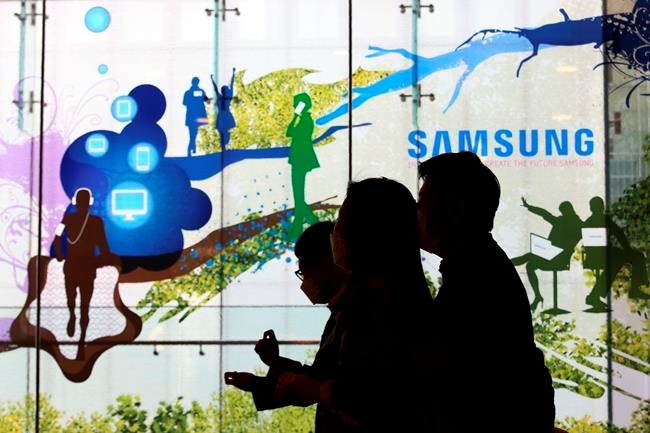SEOUL, Korea, Republic Of — Samsung’s founding family will donate tens of thousands of rare artworks, including Picassos and Dalis, to help them pay a massive inheritance tax bill following last year’s death of company chairman Lee Kun-Hee.
They will also give hundreds of millions of dollars to medical projects and research in an apparent attempt to improve their public image as they proceed with a multiyear plan to inherit both the wealth and corporate power of South Korea’s richest-ever businessman.
The Lee family, including his widow and three children, expects to pay more than 12 trillion won ($10.8 billion) in inheritance taxes, which is more than half the wealth Lee held in stocks and real estate, Samsung said Wednesday. This would be the largest amount in South Korea and more than three times the country’s total estate tax revenue for last year.
Giving away the late chairman’s vast collection of art masterpieces would reduce the taxable portions of his estate.
The family plans to divide the payment in six installments over five years, while making the first payment this month.
“It is our civic duty and responsibility to pay all taxes,” the Lee family said in a statement. They had until Friday to report the extent of the inheritance and payment plans to tax authorities.
Raising cash for the tax payment is crucial for the Lee family to extend its control over Samsung’s business empire, which extends from semiconductors, smartphones and TVs to construction, shipbuilding and insurance. Some analysts say the process could result in a shakeup across the group.
The late Lee owned 4.18% of Samsung Electronics, which is one of the world’s biggest makers of computer memory chips and smartphones, but also held stakes in Samsung affiliates that collectively owned a larger share than his in the crown jewel electronics company. The complex shareholding structure has allowed Lee and his family to exert broad control over the group.
In Wednesday’s statement, Samsung did not mention how Lee’s widow and children would split his assets, and there’s speculation they haven’t reached a final agreement.
Most market analysts believe Lee’s shares will be distributed in a way that would strengthen the leadership of his only son and corporate heir, Lee Jae-yong, the de facto chief of Samsung Electronics who is currently imprisoned for bribery and other crimes. Lee’s other children are Lee Boo-jin, CEO of Samsung’s Shilla luxury hotel chain, and Lee Seo-hyun, who heads the Samsung Welfare Foundation.
The family plans to donate 23,000 art pieces from Lee’s personal collection to two state-run museums. They include old Korean paintings, books and other cultural assets designated as national treasures, and modern Korean painters such as Park Soo-keun and Lee Jung-seop. There are also the works of Marc Chagall, Pablo Picasso, Paul Gauguin, Claude Monet, Joan Miro and Salvador Dali, Samsung said.
The National Museum of Modern and Contemporary Art said the 1,488 pieces it received from the Lee family was its biggest private donation. The works included Lee Jung-seop’s “Bull,” Dali’s “Family of Marsupial Centaurs,” Monet’s “Water Lily Pond (Le Bassin Aux Nympheas),” and Chagall’s “Red Bouquet With Lovers (Les Amoureux Aux Bouquets Rouges).”
The National Museum of Korea will receive around 21,000 pieces from Lee’s collection of Korean traditional art, including paintings, ceramics and sculptures.
Hwang Hee, South Korea’s culture minister, said some of the art donated by Lee will be displayed for the public starting in June. He expressed “deep gratitude” to the Lee family for “enriching” the country's cultural assets, but he sidestepped questions on whether he thought Samsung was trying to create a positive atmosphere for Lee Jae-yong to get pardoned.
Lee family will also donate 1 trillion won ($900 million) to help fund infectious disease research and treatment for children with cancer and rare illnesses.
About half of that money will be used to help finance the establishment of a 150-bed hospital providing specialized treatment for infectious diseases. Experts had raised the need for such facilities equipped with negative pressure rooms and other advanced systems following the emergence of COVID-19.
About 300 billion ($267 million) of the funds will go into a decadelong program with the Seoul National University Children’s Hospital to help families pay for the treatment of children with cancer and rare diseases and support clinical trials and drug development.
“Members of the (Lee family) hope to
Before his death in October, Lee was credited for transforming Samsung Electronics from a small television maker into a global giant in semiconductors and consumer electronics. But his leadership was also marred by corruption convictions that highlighted the traditionally murky ties between the country’s family-owned conglomerates and politicians. He had been hospitalized for years following a heart attack in 2014.
Lee Jae-yong, who has since helmed the group in his capacity as vice chairman of Samsung Electronics, is currently serving a 2 1/2-year sentence for bribing then-President Park Geun-hye and her close confidante to win government support for a 2015 merger between two Samsung affiliates. The deal helped strengthen Lee’s control over the Samsung group, but the revelations about his corrupt ties with the Park government fueled a 2016 corruption scandal that spurred huge protests and ousted Park from office.
The younger Lee has vowed to improve Samsung’s corporate culture, declaring that heredity transfers at the group would end and that he wouldn’t pass the management rights he inherited to his children. He also said Samsung would stop suppressing employee attempts to organize unions, although
A growing number of politicians, religious and business leaders have been calling for President Moon Jae-in to pardon Lee. They say it would help Lee strengthen Samsung’s global leadership in semiconductors and he could possibly use his business reach to help the country secure more coronavirus vaccines.
Critics point out that Samsung didn’t show signs of trouble when Lee was in jail in 2017 and 2018, and that prison terms have never really stopped corporate leaders from relaying their management decisions from behind bars.
Kim Tong-Hyung, The Associated Press



